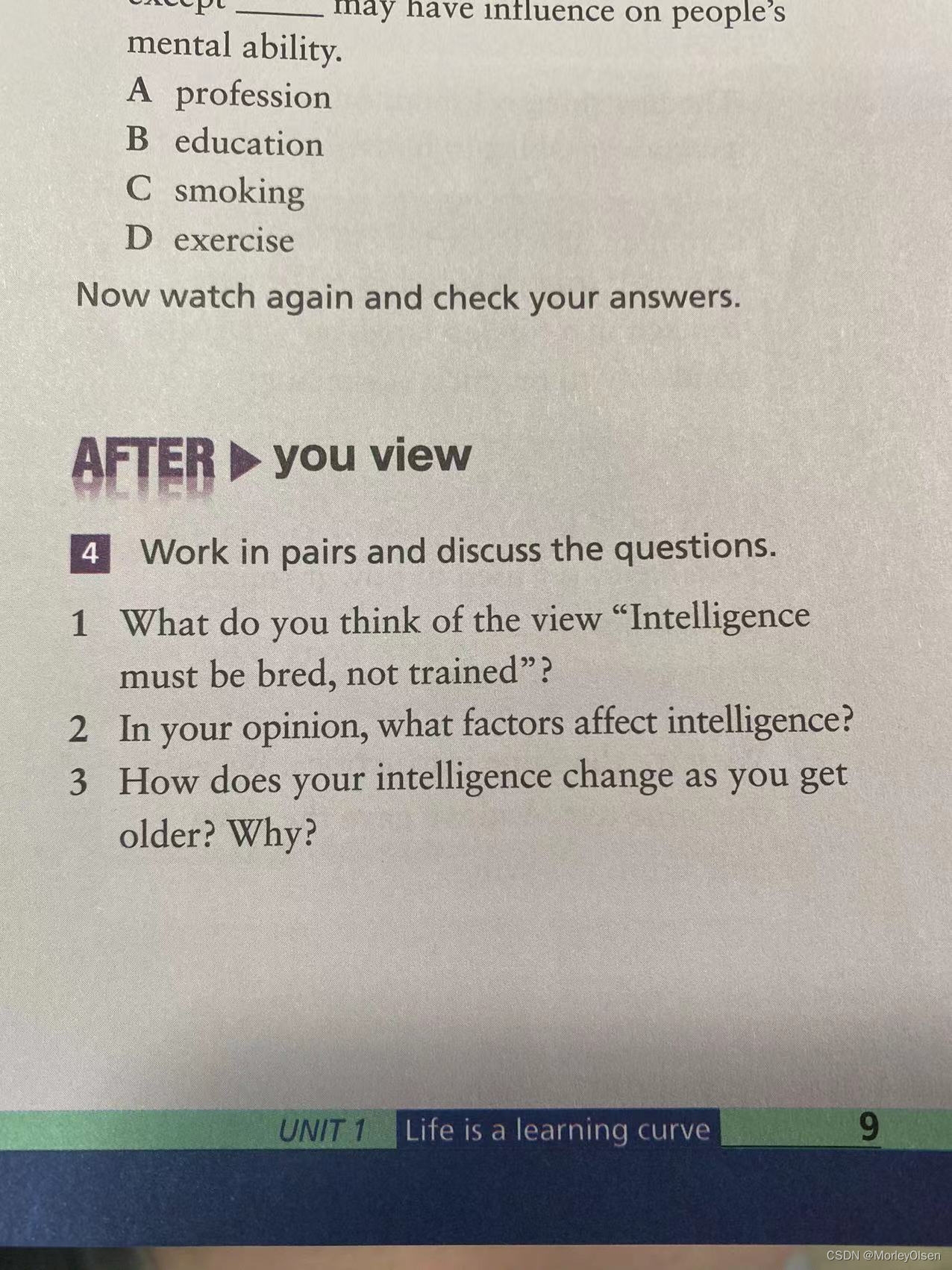题目:
book 2, page 9, question 4

回答:
1: What do you think of the view “Intelligence must be bred, not trained”?
I think this view is biased. The view suggests that intelligence is primarily determined by genetic factors and inherited traits rather than being something that can be significantly developed or improved through training and education.
Most researchers and experts agree that intelligence is not solely dependent on genetics. Rather, it is a complex interplay between genetic inheritance and environmental influences. While genetics may set some boundaries on an individual's potential, the capacity for learning, adaptation, and intellectual growth remains a fundamental aspect of human intelligence that can be cultivated and enhanced through education and training.
2: In your opinion, what factors affect intelligence?
Intelligence is influenced by a combination of genetic and environmental factors. Environmental factors, including access to quality education, early childhood experiences, nutrition, and cultural influences, play a crucial role in shaping an individual's cognitive development. Physical and mental health, neurological factors, personal experiences, motivation, and exposure to stimulating activities also contribute to one's overall intelligence.
3: How does your intelligence change as you get older? Why?
Childhood and adolescence are periods of significant cognitive development, while adulthood and middle age generally see stable or improved cognitive abilities, especially in areas like knowledge and expertise.
However, fluid intelligence, which involves reasoning and adapting to new situations, tends to decline gradually with age. Brain changes and individual differences play a role, with some older adults maintaining high cognitive function while others may experience more significant declines.
Health conditions and lifestyle choices can also influence cognitive changes. Staying mentally and physically active, along with maintaining good health, can help preserve cognitive function as one gets older.
百度参考:
1) What do you think of the view “Intelligence must be bred, not trained ”?
I think the view “ntelligence must be bred, not trained is biased. This view states that intelligence is determined by a person 's genes and psychological attributes. According to this nature view of intelligence, children born to intelligent parents end up intelligent themselves whereas children whoare not born from intelligent parents do not. Another view of intelligence, the nurture view states thatall humans are born as a “blank slate and that intelligence is formed from personal experience anddeveloped through education and exposure to the world. In line with this view, raising children in anintellectually-stimulating environment will make them more intelligent, and children of well-to-dofamilies are at an advantage compared to children born with low-income families. The nature versusnurture debate of intelligence has been going on for many years. Now research has shown thatbother nature and nurture play a role in intelligence, So I think the view “ntelligence must be bred.not trained is one-sided.
2) ln your opinion, what factors affect intelligence?
I think intelligence is determined by genes and environmental factors such as nutrition, education,family background, living standards, parenting style, etc.
3) How does your intelligence change as you get older? Why?
I think my intelligence grows progressively as I get older. Since l was very young, I have interactedwith the natural environment and various kinds of people around me, gaining a lot of first-handexperience from nature and society. When I became old enough to read, I began to read a vastvariety of books, accumulating a large amount of knowledge on diverse subjects. In this way, myintelligence gradually grows, and I believe I l'l be more intelligent and wiser as time passes by.









)


)






